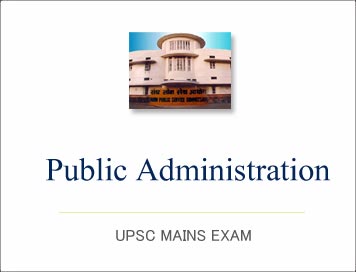(Download) UPSC IAS Mains 2011: Public Administration (Paper - 2) Optional Question Paper
(Download) UPSC IAS Mains 2011: Public Administration (Paper - 2) Optional Question Paper
Subject: Public Administration
Exam Date: 2nd November 2011
File Size: 1.49 MB
Paper: II
File Type: PDF
Paper- II
:: Section A ::
Q.1. Attempt the following in not more than 200 words each:
20×3=60
(a) “Over-dependence on bureaucracy for bringing about socio-economic
development in India has proved to be dysfunctional.” Comment.
(b) “The performance of Lok Ayuktas in various States has been uneven.” Comment
with example.
(c) Explain with appropriate illustrations the interface between political
culture and bureaucratic culture in contemporary India.
Q.2.
(a) Discuss the evolution of the role of the Prime Minister’s
Office (PMO) since independence.
(b) “The performance of Lok Ayuktas in various States has been uneven.” Comment
with examples.
(c) Explain with appropriate illustrations the interface between political
culture and bureaucratic culture in contemporary India.
Q.3.
(a) Comment on the following statement: “The Comptroller and
Auditor-General that hobbles its functioning, a judge without the power to
sentence and a litigant with no right to appeal.”
(b) “Indian federalism is passing through a state of potential maturity.”
Discuss this statement in the context of the views of the Commission on
Centre-State Relations (Justice M. M Punchi). 30
Q.4.
(a) “The theme of Police Reforms continues to haunt the
Parliament.” In the right of this statement, discuss the state of Criminal
Justice System administration in India. 30
(b) ‘Performance Appraisal System’ with special reference to the Performance
Management and Evaluation System (PMES) are expected to transform the
bureaucratic culture of Indian administration. Do you agree? Give reason. 30
:: Section—B ::
Q. 5. Attempt the following is not more than 200 words
each: 20×3=60
(a) “The real problem of administrative reforms in India at the State and
the local levels in that they are imposed from above.” Comment.
(b) Discuss the basic principles of ‘New Localism’ as a part of the global-local
debate.
(c) “Absence of District Planning Committees in a large number of districts has
prevented convergence of planning at the district level.”
Examine the above statement with examples.
Q.6. Discuss the concept of community policing and bring out the implications of the given statement. 30
(a) (i) “One Lok Pal, howsoever strong it may be, cannot
eliminate corruption in the politico-administrative system in India.” Comment.
15
(ii) “Grievance redressal system is perhaps the weakest link in India’s civil
services management.” Comment. 15
(b) “Community policing has become a victim of elite capture.”
Q.7.
(a) Can the holding company’s structure act as in
institutional change to add to efficiency? Give your answer with appropriate
illustrations. 30
(b) Examine the institutional vulnerability of municipal governance in the midst
of an emerging spectre of multiple partnerships. 30
Q.8.
(a) (i) Identify the different conceptual categories of
disasters. 15
(ii) Write a note on the new culture of disaster management. 15
(b) “Disaster insurance is desirable but not an easy proposition to implement.”
Illustrate with suitable examples. 30


